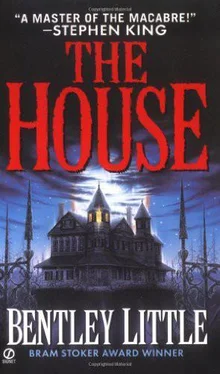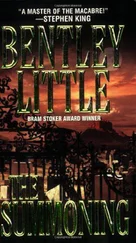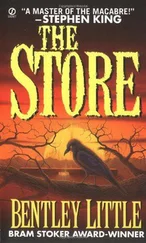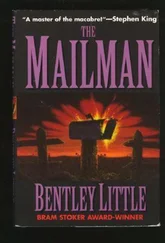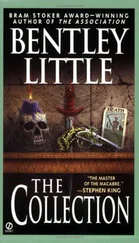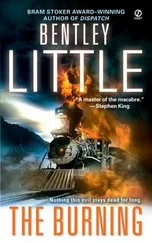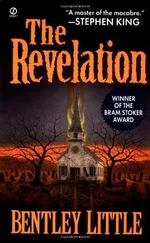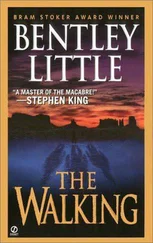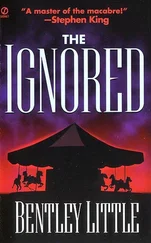They drove toward Phoenix, a series of dying desert towns bleeding into each other, empty cinderblock buildings in the open spaces between them making it difficult to determine where one town ended and the next began.
Through the side window, Mark saw a rock shop.
Faded pink paint on a dirty window read: sale!!
agates! jasper! geodes! Tireless cars sat on blocks next to the store, their exposed axles rusted and sagging, wrecked corners of their bodies twisted into unrecognizability.
A white cross near a burned section of desert memorialized some driver's death, and Mark wondered who was taking care of Kristen's burial arrangements. Would Billings still be there? he wondered. Would the assistant have remained even after their parents' deaths? Would Kristen have kept him on or would she have let him go?
Did Kristen have any friends? Maybe they were seeing to the arrangements.
He just hoped he didn't arrive too late. He wanted to be there for the funeral. And if there was no funeral, if the county or some social services agency simply provided her with a generic burial, he wanted to make sure that that was rectified, that she was put to rest with dignity.
Kristen deserved at least that much.
Mark closed his eyes, lulled by the heat and silence and the motion of the Land Rover. In his mind, he saw Kristen as she'd looked the last time he'd seen her:
shorts and a tank top, hair long and straight and blond, sunlight glinting off her braces, tears in her eyes, the house behind her.
The house.
He did not think of the house too often, tried not to think of it at all. He remembered as a child watching Giant on television and being freaked out by how eerily similar the gothic ranch house was to that of his own family. Like the structure in the movie, their home sat alone on a flat desert plain, an island of darkness in an endless sea of tan. Two and a half stories with a wraparound porch, the house, with its deep gray-black wood and permanently shuttered windows, its gables and wrought-iron weathervanes, gave the impression of age, permanence, and old-fashioned authoritarian power. It was an intimidating building, and it had always frightened his friends from school, had always been the recipient of wide-eyed stares and hesitant approaches, treated with trepidation and barely concealed fear--unlike the house in the movie, which, despite its appearance, had been treated as though it was not unusual, not out of the ordinary, yet another average ranch building.
The movie had disturbed him. It was not traditionally scary, was a light epic drama with comedic overtones, but the specter of the ranch house, its dark prominence, had been more than a little unsettling. Halfway through the film, the interior of the house had changed, been remodeled, and that wasn't so bad. The lighter walls and furniture looked fake, setbound , and that had enabled him to disassociate the movie home from his own.
His father, he remembered, had loved that film.
He'd known early on that there was something different about his family. They hadn't socialized with the other people in the extended series of adjoining ranches known as the town of Dry River, his parents keeping to themselves, associating only with his father's assistant Billings and with the occasional old friends or relatives who visited from back east. Even when Mark had started going to school and making friends of his own, he had the impression that his parents disapproved, that they would rather he not bring any other kids home--which seemed to be fine with his friends since they were afraid of the house anyway. He'd ended up spending most of his childhood at other people's houses, inventing a family that did not exist in the stories he told, lying and exaggerating in order to make his parents seem more normal, expanding his personal mythology to include Kristen when she'd come along.
It had been the ritualization of their lives, he supposed, that had first caused him to start thinking about moving away, the fact that his father made them eat breakfast every morning at exactly six o'clock, made them eat dinner at six each evening, made them sit in exactly the same spots each time, made them all go to bed at precisely nine o'clock, made them sit in separate rooms for an hour each night reciting their Daily Words.
Other parents didn't do that, he knew. People sometimes said prayers, ate together, but they didn't regiment their lives to the extent that his parents did.
And they did not beat their children when some slight mistake or miscalculation made them a second or two late for one of these ritualized practices.
As his parents did.
But, still, they were his family. And there was no way that he could leave Kristen. She needed him. He took the heat that would have otherwise fallen on her. And he kept her from buying into their parents' wackiness completely, kept her grounded as much as possible in the real world.
Then it had happened.
Even now, goose bumps popped up on his arms when he thought about it.
It had been a Saturday afternoon. Midsummer. Monsoon season. Kristen and his parents had gone into town, and he was alone. Billings was somewhere on the property, seeing to the chickens. Mark did not like being by himself in the house, even though he had lived there his entire life, and until now he had successfully avoided finding himself in this predicament, had not been alone in here since the time when he was five and had gotten lost in the maze of passageways and his father had rescued him, screaming, from a darkened hall that seemed to have no end.
He was older now, a high school graduate, but he still felt like a little kid, still felt that same sense of oppressive fear as he sat in his bedroom and realized that there was no one home but himself. He considered going outside, finding something to do in the barn or in the field or in the coops until his parents returned, but his room was upstairs and he didn't want to have to walk all the way down the hall, down the stairs, through the living room and through the sitting room in order to go outside.
It was a long way to the front door, and he thought it would be better if he just sat in here and waited with the door closed until someone else came home.
He had a stereo by his bed, and he kept his tunes cranked up while he read a car magazine, trying not to think of the silent emptiness of the house surrounding him, but the afternoon storm hit an hour or so later and, as often happened, the electricity went out. His lights flicked off, his music fading into a slowing deep-bassed growl before disappearing completely.
The window in his room overlooked the drive and the front yard, but the clouds were dark today and very little light entered the room. It wasn't like night, but it wasn't like daytime either, and there was something about this in-between state that accentuated the ominous aspects of the house.
He grabbed his magazine, pretending as though he wasn't scared, as though there was nothing out of the ordinary here. He was hoping that Billings had come in through the back door and was doing something in the kitchen or the workroom, but when Mark walked out from his bedroom, the silence of the house was total, and he realized that the assistant was still outside somewhere and he was all alone in the house.
The hallway before him was dark. No windows opened onto here save one small inset square of stained glass at the far end, above the staircase. All of the doors to the other rooms were closed. There were goose bumps on his arms, and Mark ran as quickly as he could down the corridor, taking the steps two at a time as he sped downstairs.
This stairwell opened onto another hallway and he was already sprinting down it when he noticed movement somewhere in front of him.
He stopped in his tracks, heart pounding.
Читать дальше
